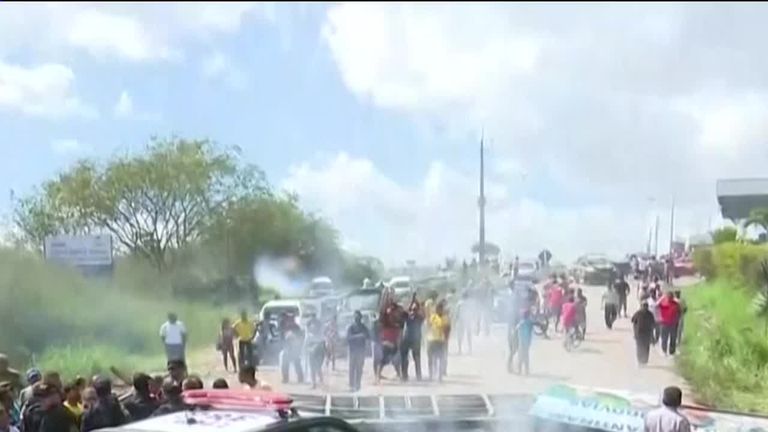Why is Venezuela a country in turmoil?
Sky News takes a look at the chaos in the South American country where eggs have become a form of currency.

Tuesday 28 August 2018 09:57, UK
By Adam Parsons, business correspondent
Venezuela is a country in turmoil.
Its economy is in a terrible mess, with output falling, inflation going through the roof and workers trying to escape the country.
Above the ground, it is a nation full of discord and misery; yet below the surface, it has vast reserves of oil, worth untold billions.
On Tuesday, it brought in a range of fixes - a huge hike in the minimum wage, more expensive fuel, and a new currency that's pegged to a crypto-currency based on the price of Venezuelan oil.
So what gives? How can things go so wrong in a country that should be wealthy?
What's the big problem now?
In Venezuela, inflation is completely out of control.
The International Monetary Fund predicts it will reach a million percent by the end of the year.
The country cannot borrow money on the international markets after defaulting on a whole range of debts.
To make ends meet, it chose to simply print more and more cash - a sure-fire way of creating inflation.
What happens when inflation runs riot?
Uncertainty and unhappiness.
Paper money goes out of fashion because its value is constantly dropping.
The wealthy invest in assets - houses, or maybe shares in America.
Poor people start bartering - eggs have become a form of currency in Venezuela.
Banks don't want to have lots of money, so cashpoints run out quickly.
A black market develops for dollars.
What caused this?
Lots of things over the past 20 years, but largely the country's huge reliance on the value of oil.
It spent, and borrowed, heavily during the good time, then suffered when the price fell.
Successive presidents have also nationalised industries - oil, steel, telecommunications, banking - and sacked experienced staff.
Starved of investment, maintenance and skills, the oil and steel industries are much, much less productive than they were 20 years ago.
Add in a decent slice of corruption, controls over capital and currencies, an inability to borrow from most markets, reluctance of global businesses to invest and then stir in sanctions from America and you get a big problem.
Venezuela simply doesn't generate the money it needs to get by.
So it printed loads instead, hence rampant inflation.
What's the Government's response?
President Maduro has brought in a new currency - the "Sovereign Bolivar" takes the place of the spectacularly misnamed "Strong Bolivar".
It's exactly the same, except that it's got five fewer zeroes at the end of the number.
So 100 Sovereign Bolivars has the same value as 10 million Strong Bolivars.
Mr Maduro has also pegged its value to that of the Petro, which is a new (and widely derided) cryptocurrency based on the value of a barrel of Venezuelan oil.
The Petro is worth 3,600 Sovereign Bolivars, meaning each of the new bolivars is worth 1.3p.
Or, at least, it is today.
Anything else?
He has increased the minimum wage by 3,400% and whacked up the price of fuel for the half of the population that doesn't have a Venezuelan fatherland card.
Both of which will have huge repercussions to the economy
State-issued "fatherland cards" grant access to certain welfare programs for poor Venezeulans.
Will this solve the problem?
Very, very unlikely.
Chopping zeroes off a currency is like changing the numbers on a speedometer.
Even if it says I'm doing 200mph, the reality is I'm actually chugging along at 20mph, just like before.
Inflation will still render household staples unaffordable to many.
And marrying your currency to a home-grown crypto based on the oil price looks like a triumph of optimism over reality.
What could he do?
He could peg his currency to the dollar, as plenty of other countries have done, but he probably won't.
President Maduro has long accused America of waging economic war against his country and he's unlikely to adopt his enemy's currency any time soon.
What about the Venezuelan people?
It's hard to feel optimistic.
Huge numbers have already fled the country.
Those who stay are dealing with shortages of food, medicine and security - Caracas now has the highest murder rate in the world.
In a poll at the end of last year, half of young people say they wanted to leave the country, mostly because of the state of the economy.
There are already a million Venezuelan migrants in Colombia alone - some are already predicting that more people will flee Venezuela than fled Syria.






